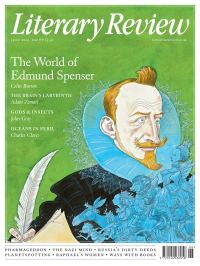Rowland Manthorpe
Highland Games
The Deadman’s Pedal
By Alan Warner
Jonathan Cape 376pp £12.99
Alan Warner has written six previous books of electric impersonation, placing neon-tinged phrases in the mouths of characters far removed from his actual self. His great first novel, Morvern Callar, was written in the Scots dialect of a working-class, female Mersault; the brilliant The Sopranos was told in the hooched-up babble of a group of Catholic schoolgirls. The further from himself Warner goes, the more inventive he seems to be. It makes a certain kind of sense, then, to find his most autobiographical work to date told in his most subdued voice.
Born in 1964, Warner grew up in the West Highlands, near Oban, the place where those early works were set, and where this book returns. It is the early Seventies and Simon Crimmons is fifteen and aching to do something: ‘Not just for summer. That’s like playing. I mean for

Sign Up to our newsletter
Receive free articles, highlights from the archive, news, details of prizes, and much more.@Lit_Review
Follow Literary Review on Twitter
Twitter Feed
Under its longest-serving editor, Graydon Carter, Vanity Fair was that rare thing – a New York society magazine that published serious journalism.
@PeterPeteryork looks at what Carter got right.
Peter York - Deluxe Editions
Peter York: Deluxe Editions - When the Going Was Good: An Editor’s Adventures During the Last Golden Age of Magazines by Graydon Carter
literaryreview.co.uk
Henry James returned to America in 1904 with three objectives: to see his brother William, to deliver a series of lectures on Balzac, and to gather material for a pair of books about modern America.
Peter Rose follows James out west.
Peter Rose - The Restless Analyst
Peter Rose: The Restless Analyst - Henry James Comes Home: Rediscovering America in the Gilded Age by Peter Brooks...
literaryreview.co.uk
Vladimir Putin served his apprenticeship in the KGB toward the end of the Cold War, a period during which Western societies were infiltrated by so-called 'illegals'.
Piers Brendon examines how the culture of Soviet spycraft shaped his thinking.
Piers Brendon - Tinker, Tailor, Sleeper, Troll
Piers Brendon: Tinker, Tailor, Sleeper, Troll - The Illegals: Russia’s Most Audacious Spies and the Plot to Infiltrate the West by Shaun Walker
literaryreview.co.uk